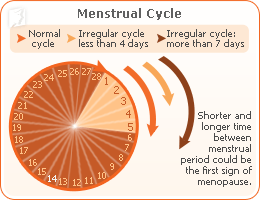
Perimenopause is the stage that leads up to menopause. It usually lasts for a few years, but may persist for up to 10. Perimenopause symptoms are the first indications of menopause, and it is during this time that a woman's body prepares itself for the menopausal transition.
The hormonal changes that occur during perimenopause can trigger a range of symptoms that are important to know in order to manage them. The hormone estrogen declines during this period, which is what is behind these menopause symptoms.
Identifying Perimenopause Symptoms
The four of the most common menopause symptoms are:
Hot flashes. Hot flashes are generally considered the most common symptom of this phase. Hot flashes are sensations of extreme heat in the upper body and can be accompanied by a rapid heartbeat, reddening of the chest, neck, and face, and heavy perspiration.
Night sweats. Another typical symptom of perimenopause, these are episodes of sweating that occur at night and often disrupt a woman's sleep. Night sweats are often associated with sudden and intense feelings of heat, flushing, irregular heartbeat, nausea, headaches, and chills.
-

Irregular periods. Typically, the earliest symptom of perimenopause to appear is irregular periods. When a woman reaches menopause, it means that she has not had a menstrual period for one year. A woman can experience irregular menstruation leading up until this point.
Loss of libido. This is a frequent symptom of perimenopause that affects 20 - 40% of women. Loss of libido can be caused by many different factors, not just changing estrogen levels. It is normal for a person's sexual desire to fluctuate over time.
Other frequently-reported perimenopause symptoms include:
- Disturbed sleep
- Mood swings and irritability
- Poor memory
- Vaginal dryness
The Onset of Perimenopause Symptoms

Many women experience perimenopause symptoms while still having periods. Each woman enters perimenopause at different times, and this typically ranges from the early 40s to the late 50s. Likewise, each woman's perimenopause experience is unique, and not all women have the same symptoms to the same degree.
While some women do not experience severe or bothersome symptoms, it is recommended to visit a doctor if your symptoms are altering the quality of your life and you would like to treat them. Click on the following link to read more about perimenopause treatments.
Sources
- Mayo Clinic Staff. (2015). Menopause. Retrieved December 15, 2015, from http://www.mayoclinic.org/diseases-conditions/menopause/basics/definition/con-20019726
- National Health Service UK. (2015). Menopause. Retrieved December 15, 2015, from http://www.nhs.uk/conditions/menopause/pages/introduction.aspx



